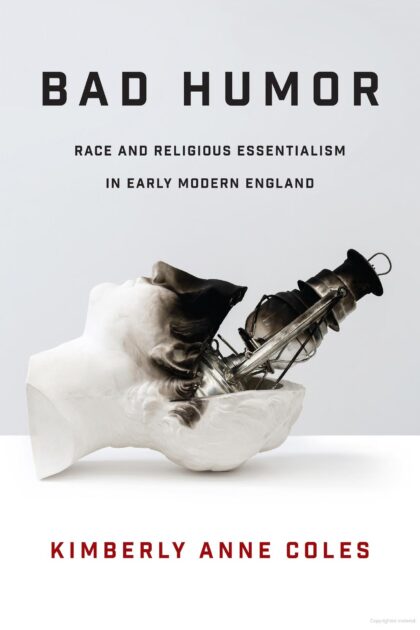Book Reviews
A Review of Kimberly Anne Coles’s Bad Humor: Race and Religious Essentialism in Early Modern England
 The stakes of religious identity for early moderns were both extraordinarily high and cast in terms that can feel alien to many 21st-century readers; even the religiously literate may struggle to understand why so many people cared so deeply about the finer details of such things as sacramental theology or eschatology. In Bad Humor: Race and Religious Essentialism (U. of Penn. Press, 2022), Kimberly Anne Coles illuminates another way in which the religious past is another country. Building on a rich body of prior work on humoral theory, the soul-body connection, and early modern strategies of race-making, Coles unites these often-disparate subfields to make an original intervention. As Coles argues, early moderns understood right belief as not just an intellectual or emotional matter, but a somatic one. If the state of the soul could affect the body—and vice versa—then irreligion might literally be written on the skin.
The stakes of religious identity for early moderns were both extraordinarily high and cast in terms that can feel alien to many 21st-century readers; even the religiously literate may struggle to understand why so many people cared so deeply about the finer details of such things as sacramental theology or eschatology. In Bad Humor: Race and Religious Essentialism (U. of Penn. Press, 2022), Kimberly Anne Coles illuminates another way in which the religious past is another country. Building on a rich body of prior work on humoral theory, the soul-body connection, and early modern strategies of race-making, Coles unites these often-disparate subfields to make an original intervention. As Coles argues, early moderns understood right belief as not just an intellectual or emotional matter, but a somatic one. If the state of the soul could affect the body—and vice versa—then irreligion might literally be written on the skin.
Coles’s book covers approximately a century, tracing what she sees as a historical process in which wrong religion and its bodily manifestations became ever more tightly linked. Eventually, dark skin would be taken as evidence that a person was “permanently pagan” (2), but in the earlier decades covered by her study, the relationship between outward appearance and irreligion was somewhat more fluid. In part, this is because, in the Elizabethan and Jacobean periods, the disordered bodies and souls that most preoccupied English Protestants were those of Catholics, which is to say, fellow Europeans. Although prior…
Please login or subscribe to continue reading.
Please subscribe to The Shakespeare Newsletter to continue reading.
Subscribe Now